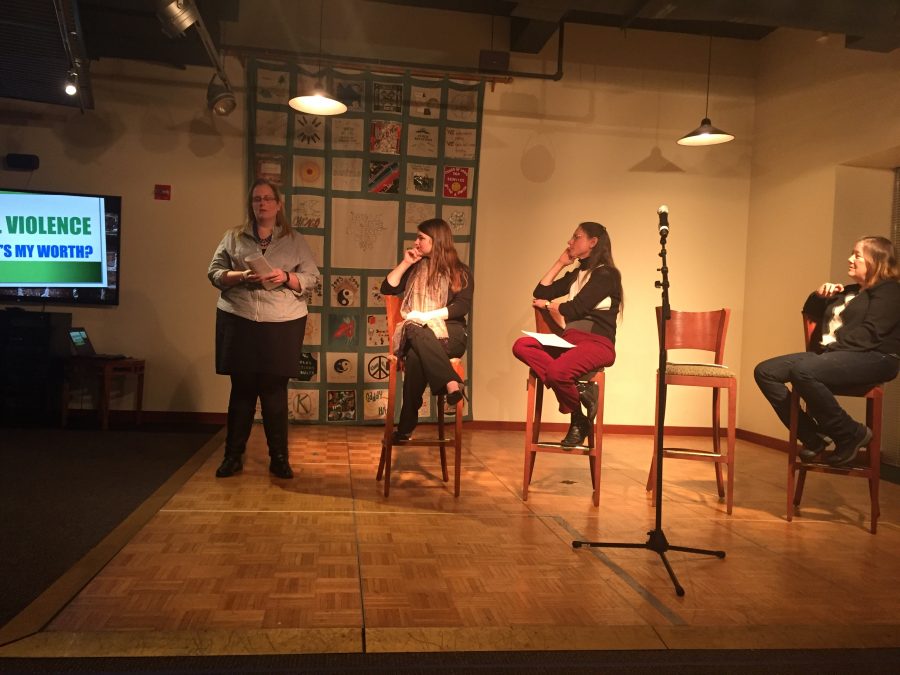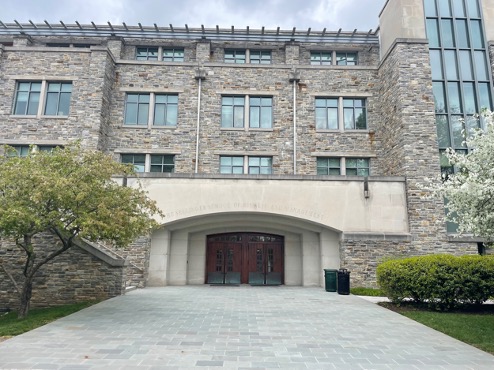On Tuesday, Feb. 16, and Wednesday, Feb. 17, Loyola’s Student Government Association hosted two nights of panels for the “How Much am I Worth?” campaign. The first night of discussion included faculty members and staff of Loyola addressing issues of sexuality and sexual violence in today’s society, and the second night included six students sharing their experiences of surviving sexual violence.
Dr. Konradi of Loyola’s sociology department began the first night of panels in examining “the problem behind sexual assault” from a sociological perspective. She explained that rape, being an action where one person imposes themselves on another person, is “treating a person as if they don’t have the right to control themselves.” Dr. Konradi shared a personal experience with sexual assault and explained that often in sexual assault cases, the bodies of those assaulted are treated as objects—people are treated as commodities. This, she explained, contributes to the idea that sexual assault and rape are actually “social murder.”
Dr. Dale Snow of Loyola’s philosophy department took a slightly different approach to discussing sexual violence. She began her discussion by defining marriage in early America as the joining of men and women so that the man and the woman become one, which is to say, she remarked, that the woman disappears. She addressed the traditional social role of a man, saying that men are regarded as ones who take action. This point was furthered by her explanation of the different ways that society looks at sexual acts of men and women: She said that “when men have sex, they’re called a stud, when women have sex, they’re called a slut.”
Dr. Snow also said that when men are regarded as the action-takers, women are looked at as property. “What happens when property is used? It falls in value,” Dr. Snow said, comparing society’s views on virginity and sexuality to a car depreciating in value when it is driven off the lot. She touched on modern media’s portrayal of women as slightly improved from decades past, citing “Harry Potter” and “Buffy the Vampire Slayer” as examples of pieces of modern pop culture that feature strong female characters — “agents,” as she called them. “Social murder is difficult to perpetrate on someone who sees herself as an agent,” Dr. Snow concluded.
The final speaker of the evening was Melissa Lees, Loyola’s sexual violence response, education, and prevention coordinator. Lees began her presentation by sharing sexualized images used in modern advertising. She intentionally removed all of the brands and labels from the advertisements and asked the audience to try to discern from the hypersexual images what kind of product the advertisement was trying to sell. Images ranged from a Dolce & Gabbana ad featuring a man pinning a woman down with three men in close proximity observing, to a hair product ad that has the words, “Look good in all you do” above an image of a woman with a black eye receiving a diamond necklace from her partner.
Following her demonstration of the ways that sexual violence is portrayed by the media, Lees addressed the ways that our language is associated with sexual violence. For example, Lees cited young people’s use of the word “pimp,” explaining that it is often used in a positive sense, meaning “to make something better.” In reality, though, she explained that a pimp is a person who takes young girls and sells them for high rates into sexual slavery at brothels and other sex institutions.
Lees then tied her discussion into Catholic social teaching that recognizes the life and dignity of the human being. She explained that this teaching states that “human life is sacred and the dignity of a person is the foundation of society.” Lees concluded her discussion by highlighting the stigma that accompanies sexual violence and rape in today’s culture where the victim is often blamed: “No one assumes that I did something wrong if I say that I was car-jacked,” Lees said.
At the end of the night, the audience was invited to participate in a question-and-answer session. Students asked questions regarding the idea that women are responsible for their rape, to which Lees responded, “Women don’t get raped because of anything they do. They get raped because someone raped them.” Students also asked about male victims of rape. Dr. Konradi replied, “When a man is raped by another man, it’s an act of emasculation.” She related her response back to her assertion that rape can be looked at as social murder, saying that sexual violence is “someone imposing their will on another person sexually.”
Following the questions and answers, Emily Brookshire, SGA’s director of student equity and co-president of Take Back the Night, also commented on other issues that need to be addressed by the Loyola community. “We talk more about sexual assault, but not about stalking, media harassment, emotional harassment […]We’ve gotten better about talking about sexual violence, but not about what it means for a student to have to go to class and see the person who’s been stalking them.”
The second panel for “How Much Am I Worth?” featured undergraduate and graduate student survivors of sexual violence sharing their stories and experiences. The events “were fantastic, especially Wednesday’s survivor panel,” Brookshire said. “It was a way for those six panelists to reach out to an unbelievably large sampling of Loyola students and address the ways in which we need to be supporting them and other survivors. It was personal, emotional, informative and a way in which we could all engage in this conversation in a more intimate way. It is personal connections that turn bystanders into active allies and that is what happened in our audience on Wednesday.”
Brookshire also commented on the need for continuing conversation on sexual violence and related issues both on the Loyola campus and in general: “Sexual assault is something that a general audience still considers a taboo, something that is better left in the dark and out of conversation. We need to be actively putting an end to that lack of engagement.” She explained that sexual violence is something that will eventually touch all of our lives in some way, and we as a community and a people need to be educated in how to respond to this problem. “Loyola is small,” said Brookshire. “There is a belief that stems, in our community, that relationship violence does not happen within our narrow borders. But it is happening here and survivors are bravely walking our grounds. These conversations help the rest of us, the allies and bystanders, better support those very brave, beautiful, kind, powerful men and women.














































































































